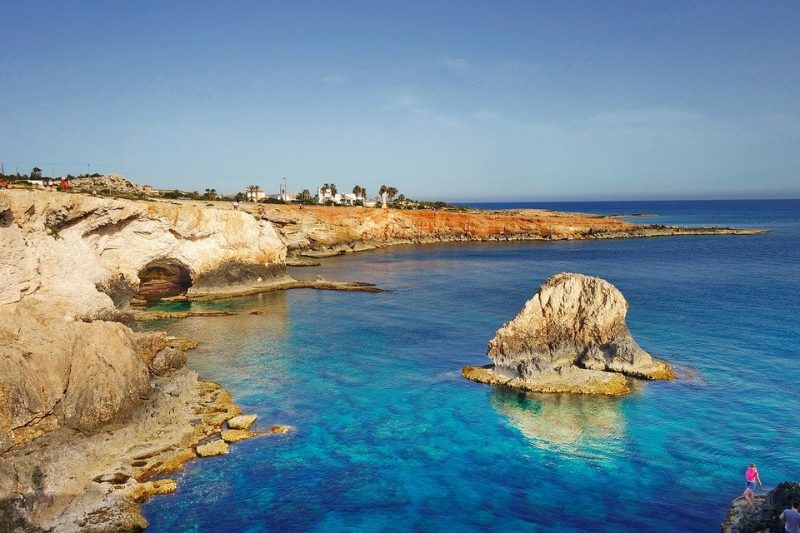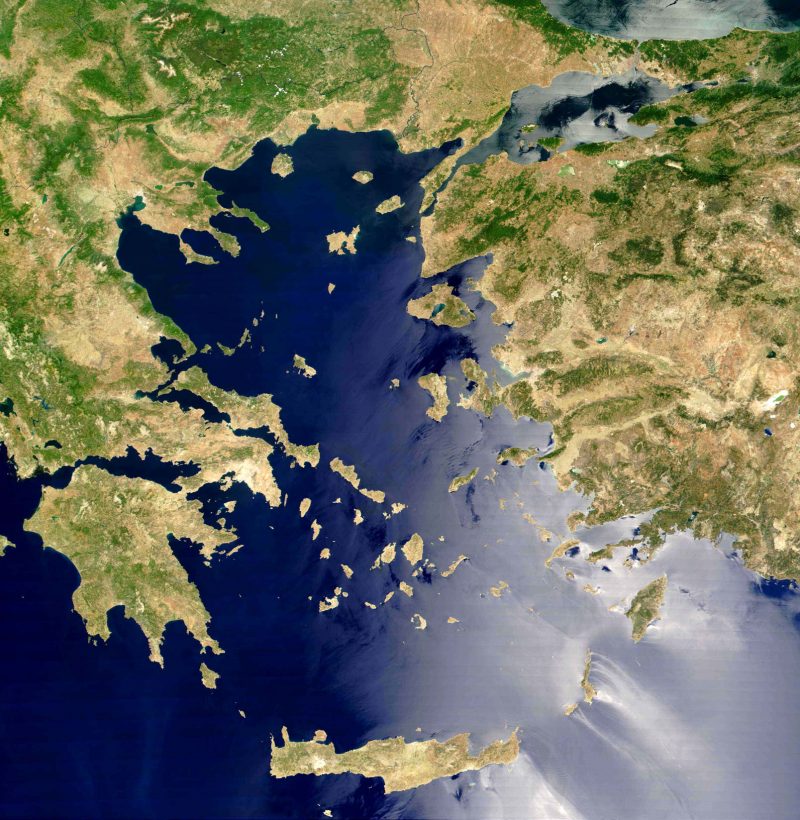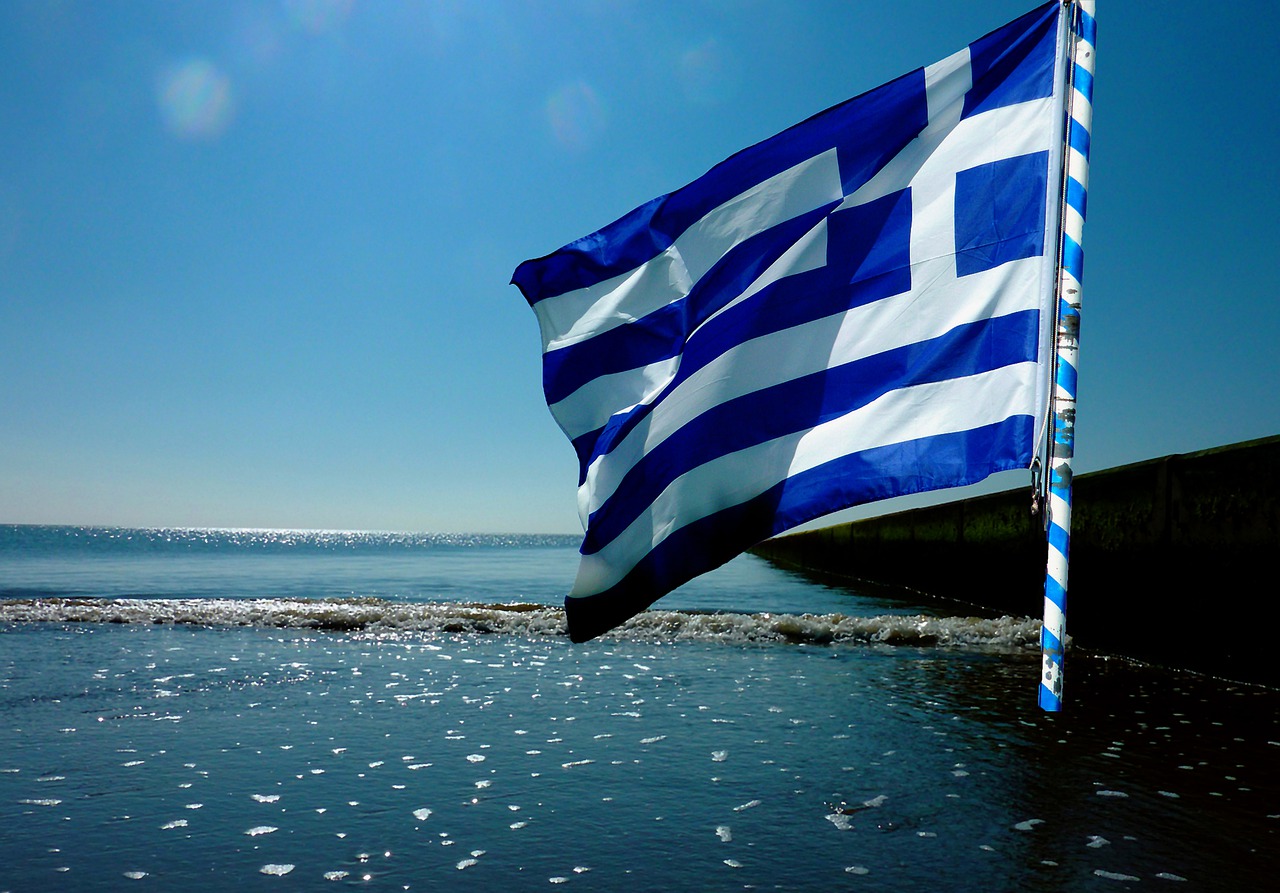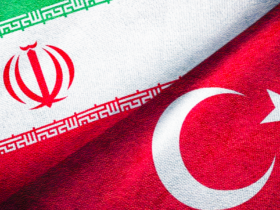When Greece was founded in 1830 at the end of an uprising against the Ottoman Empire, a King Otto, a German noble, was put on the throne. Three years before this, the Ottoman-Egyptian joint naval squadron anchored off Pylos/Navarino had been attacked and burned by the British, French and Russian joint fleet as a consequence of which the Ottoman naval presence in the Ionian Sea suffered a huge blow. The uprising which began in the Peloponnese region south of Greece, quickly spread to the north resulting in massacres of the entire Turkish population in just a matter of months. The Ottoman Empire lost Cyclades in the Aegean, as it had no effective navy in possession to re-capture and protect the area, and with that, the Turkish sovereignty over the Aegean islands, its first serious hit.
Today there is a large monument in the most beautiful part of the city of Pylos, the southern end of the Navarino coast. On three sides of that monument are the reliefs of the British, French and Russian admirals who fought in the battle of Pylos/Navarino. Oddly, there is not a single Greek hero on the monument. Tellingly, it was under 19th-century imperialism that Greece was founded in the first place.
GREECE WAS ESTABLISHED AT THE GAMBLING TABLE
There is also a financial side to the matter. After the 1821 uprising, a debt of around £3 Million in support of Greece’s establishment was given to the provisional Greek Government in Nafplio, Peloponnese. This caused hikes on the stock exchange in London between 1824 and 1825 and a final peak in 1830, thus creating a new wealthier group of citizens in the UK. In other words, Greece was established at the “gambling table”. How else can one explain that the debt given to Greece was around 120% of its gross national product at that time? Let us add that this debt was used to purchase all kinds of arms, ammunition, and uniforms from the UK. Greece has utilized this financial resource in service of the utopic Megali Idea (The Great Idea) project, which was shaped by Pan-Hellenism, Orthodox Christianity Fanaticism, and Turkophobia. Ever since, Greece has served imperialism as a proxy state.
FUNDAMENTAL ISSUES
Greece has two critical issues before it. The first is that they have acquiesced to their national fate as determined by the West throughout their history. The second is that Greece has an unrealistic, unattainable set of political goals. It is full of unfounded dreams that do not align with the country’s actual power or ability. Greece does not have a sizable population; their economy is small; their soil is infertile; and there are no notable indigenous industries. The services sector provides an insignificant contribution to the national economy, except for tourism and shipping.
THE GREEK DREAM WORLD
Nevertheless, Greece has an ideological unity both at the state and societal levels in contrast with its limited national strength. First of all, they believe that they represent the legacy of Athens, Sparta and Macedonia of the 300 B.C. on a racial and cultural basis, or in other words, that they have the privilege of being the cradle of democracy, the heir to ancient Greece, and the representative of the Hellenistic age, which form the basis of modern Western values. They also believe to have inherited from the Eastern Roman Empire via Byzantium, which was actually shaped much later in the 19th century by the Europeans. In short, they have an obsession with claiming every land in which ancient Greek was spoken, despite that this language was in fact the lingua franca of trade in the ancient times. They harbor this obsession in relation to Cyprus and Macedonia. They also apply it to Turkey’s Black Sea coast, the so-called “Pontus” region, as well. On the other hand, there is this characteristic feature worth considering, and that is a great cultural-ideological integrity and unity across the society in attaining their geopolitical goals, although this extends far beyond their real power.

Pixabay
Nonetheless, they are far more advanced in having attained this unity than the Turks (it is worth mentioning that there are many in Turkey who consider nationalism as a disease, and those who cannot even stand the idea of defining the Turkish nation, let alone recognizing Ataturk as a national leader). Greece, on the other hand, uses Turkophobia perfectly to advance its ideological indoctrination. They keep Turkophobia alive at all corners by calling Turkey the aggressor/neo-Ottoman both when an Islamist government is in power and when a secular government rules. They believe that one day they will once again organize a religious mass at the museum of Hagia Sophia in Istanbul.
GREECE ALWAYS LIVED WITH THE SUPPORT OF THE WEST
Because of its weakness, Greece knows how to achieve its goals by harnessing the support of the Great Powers. From the 19th century onwards, with the support of imperialist powers of the time, they have continuously expanded in detriment of the Ottoman Empire, which was an non-industrialized, agrarian state without a proper navy. The Greek authorities, at the helm of a nation that has kept its maritime consciousness over time, continued to expand eastwards until the First Battle of Inonu in Anatolia in 1921. Their navy was the main propellant during this period. Although the Ottomans achieved a military victory on land in the 1897 Greco-Turkish War, they were still losing due to failures at the diplomatic front. Eventually the Ottomans relinquished the island of Crete and accepted union with Greece, employing the term “Enosis” in Greek which was later to be used for Cyprus to the same effect. During the Balkan Wars, the Greeks occupied the Ottoman-controlled Aegean Islands in just two months’ time frame. They even went to the extent of offering the British Government the invitation to join the invasion forces alongside the Royal Navy at the Gallipoli Peninsula in the beginning of the First World War. There was no limit to their imagination. When they landed on Izmir during the morning of May 15, 1919, the motto of the troops on the first day was “Paleologos” (the last Byzantine Dynasty), and their calling sign was “Constantinople”.

Wikipedia
ATATURK HALTED THE GREEK EXPANSION
This expansion ended on the morning of September 9, 1922, with the Asia Minor Catastrophe. Mustafa Kemal Ataturk inflicted a great defeat on the Greek invaders resulting in eternal embarrassment. Then, Greece suffered its second defeat on the island of Cyprus, on the morning of July 20, 1974. Despite these two defeats, they took advantage of the NATO and EU memberships, abused Turkey’s reliance on the Atlantic bloc, and gained favorable de facto status over Aegean issues. They were the initiators of almost all Aegean crises leaving Turkey in a reactionary position. However, thanks to extraordinary efforts of the Turkish Navy, Ankara did not make major and irreversible mistakes on mainly the continental shelf issue, territorial waters issue, and the Kardak Crisis. But Turkish demarches and reactions did not solve any of these conflicting issues for good, it only dragged them inconclusively for years.
THE ERA OF GREEK ULTIMATUMS HAS COME TO AN END
This time, at the beginning of the 21st century, Greece had to face the reality in the Eastern Mediterranean. While expecting a policy from Turkey similar to the Aegean Sea, Greece has faced a geopolitical surprise on this front, mainly due to the fact that the Eastern Mediterranean crisis coincided with a period when the Spykman’s Rimland theory was facing a collapse, the unipolar world was evolving into a multipolar world order, and the Turkish-American alliance was turning into a Turkish-American crisis. Turkey did not back down or let the problem drag on this time. Greece immediately called the West for help. Yet, there was to be no direct assistance this time and Turkey could not be discouraged. Greece, which has not relied on its own national power, was once again defeated by the Republic of Turkey for the third time since September 9, 1922 and July 20, 1974. This time Turkey achieved geopolitical superiority without a military conflict.
Afterall, Greece was unable to reach its national goals through industrialization, economic growth, human capital growth, and especially an indigenous defense industry in the period up until the beginning of the 21st century. It had reached these goals rather with plots, multilateral alliance building, and utilizing philhellenism of the West. They have expanded to the extent that imperialism permitted it throughout the course of history. Finally, they went bankrupt after 2008, meeting the inevitable end of every gambler.
GREECE HAS NOT LEARNED FROM THE PAST
Today, it seems Greece has still not learned from history. Turkophobia and anti-Turkish sentiments continue to rise both within their government and media. The rational and wise people in their community cannot make their voices heard in the noisy political and socio-cultural climate. They still believe that they are the sole owners of the Aegean and Eastern Mediterranean. They cannot believe that Turkey has become a maritime state with considerable sea power and built a self-reliant navy that is rooted in its own national heritage and indigenous industry; they do not want to believe. They do not want to see that this naval power has been active and deployed with almost 3,000 sailors, commanding a significant firepower since January 2020, even during the Covid-19 crisis. They do not want to see the new shipbuilding projects, especially TCG Anadolu LHD, which goes on unhalted in our dockyards despite the pandemic.
WHAT SHOULD GREECE DO?
This question has only one simple answer: Greece can restrict itself to its historical dreams. It can fantasize about this grandeur, but it should not bring these unrealistic dreams into action in the Aegean, the Mediterranean or the Black Sea. These are the domains of sovereignty and interest for Turkey. Greece needs to know its limits. The Turkish Republic, founded by Mustafa Kemal Ataturk, must never repeat the mistakes of the non-maritime Ottoman Empire. The Republic would never allow the loss of a single drop of water of their Blue Homeland.
Now it is time to sit at the negotiation table and solve the chronic problems in the Aegean Sea, as every chronic disease reaches a terminal stage. The two nations that have lived together for 400 years must come together to resolve these problems peacefully before we get to that point.

















Leave a Reply